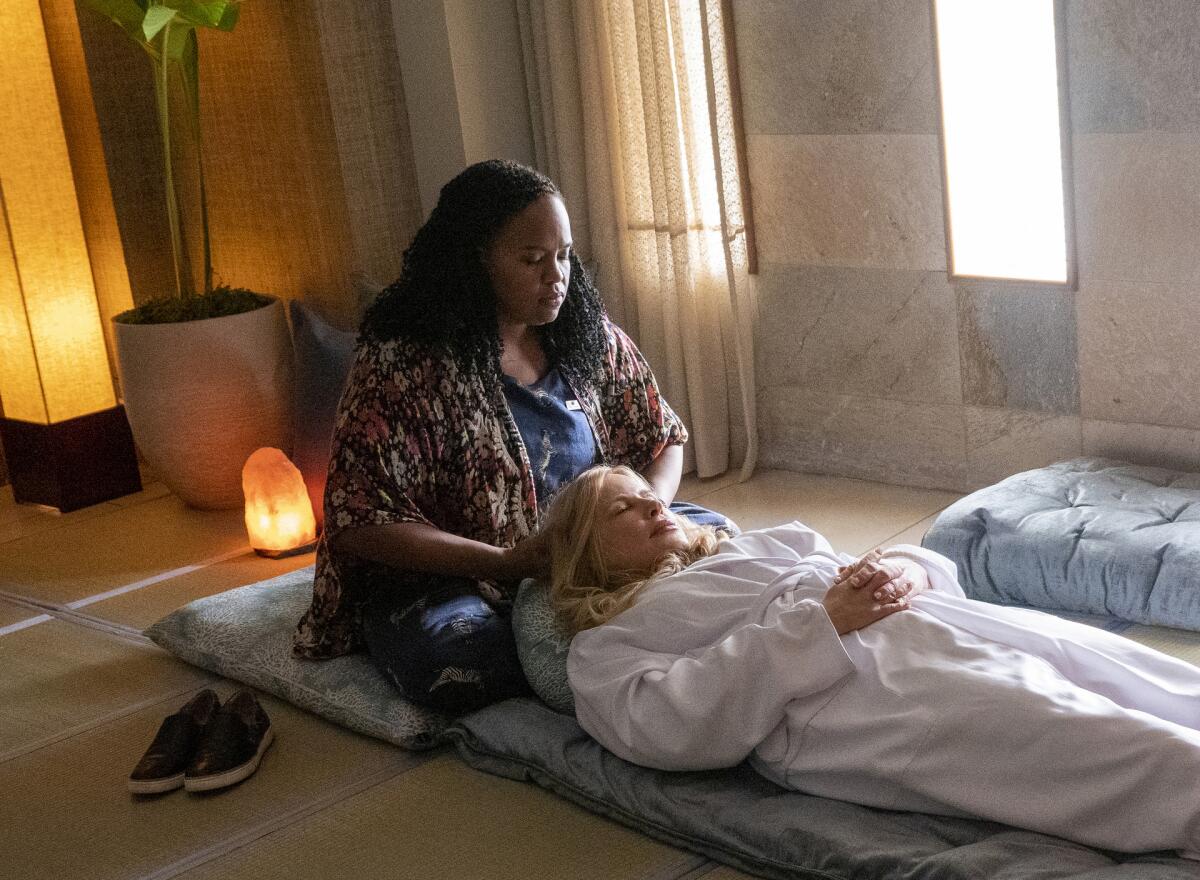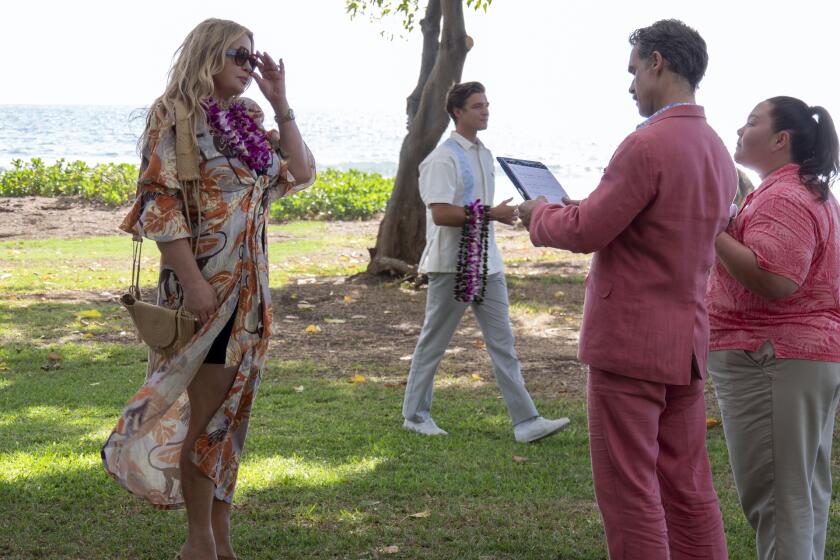That excruciating ‘White Lotus’ scene of the forgotten sunglasses was never meant to be

Jennifer Coolidge and Natasha Rothwell barely had a chance to say “aloha” to each other as castmates before they were playing their first scene together in HBO Max’s limited series “The White Lotus” as, respectively, vulnerable socialite Tanya and kind spa worker Belinda. It was also an intimate moment — the healing touch that gives Tanya an epiphany and Belinda the chance to dream.
“We flew into Hawaii and all of a sudden we’re filming that massage,” Coolidge said recently. “It’s like having a sex scene your first day of work! Natasha was so good it made it easier for me.” Rothwell says she was “in awe to be there” and could quickly see Tanya’s pain in Coolidge’s performance. “It felt right,” she says. “Just locking in on Tanya’s humanity really gave me character motivation. I understood that symbiotic relationship they have. Before it becomes parasitic.”
Though their characters’ connection rises and falls in Mike White’s exquisite, satirical series about privilege in paradise, the pairing of Rothwell and Coolidge came out on top, earning them both first-time Emmy nominations. Here, the actors behind one of this television season’s most memorable duos talk by phone about the on-set bonding behind onscreen discomfort.
Does money make everything weird?
Rothwell: There’s so many different versions of money, right? Rich versus wealthy. Old money versus new money. Young money versus geriatric money. It can really change how you see the world. The socioeconomic implications of “White Lotus” are unavoidable. You can’t talk about the show and not talk about money.
Coolidge: It can help the weirdness expand. Like gasoline on a fire. Rich people have this incredible advantage, but they’re prevented from feeling essential things. I really do believe Tanya saw Belinda as this true winner. She’s willing to help, but she doesn’t have the skill to make it happen. All that money to travel around the world and do all sorts of self-help, and it still leaves her empty.
The career of Jennifer Coolidge is filled with memorable roles. But with “The White Lotus,” she finally got some respect.
Natasha, was getting to improvise with Jennifer a bucket list item?
Rothwell: Oh, my God, yes. Stifler’s mom? Christopher Guest? are you kidding me? I’m a student of comedy, so to be able to work with her was unreal. There was nothing about her performances comedically, too, that also didn’t spark their dramatic potential. I knew she could do it all.
Jennifer, what was your takeaway from working with Natasha?
Coolidge: Her performance was masterful and complicated. I was so moved by her. She’s a hilarious person, too. We had a fun day on the boat where we really got to let loose, as if we were smashed on alcohol, riffing on our failed relationships.
You mean when Tanya’s spreading her mom’s ashes, and Jake Lacy’s and Alexandra Daddario’s characters Shane and Rachel are trying to have a romantic dinner?
Rothwell: It was really fun! We were behind Shane and Rachel having their scene, so we were improvising dialogue about what these two would talk about. It was us lamenting our horrible history with men. I think there was an STD running joke we did, talking about “mistakes made but their memories continuing on because of what they left us.”
Coolidge: It was ridiculous stuff, but it was one of the most fun times I’ve had on a job ever. And I was sort of getting seasick, so it was a relief to have this fun moment before, you know … I upchucked.
Now shooting Marvel’s Spider-Man universe action film, “Madame Web,” the young actor has shed her early struggles and self-doubts.
Their goodbye scene is intense — Tanya offering cash instead of a business investment, Belinda crying. Was that cringe moment of Tanya leaving the sunglasses behind in the script?
Coolidge: Well, Jennifer Coolidge the actress forgot her sunglasses. I came outside the doors, and Mike hadn’t [said ‘Cut’] yet, and I whispered to him, “Mike, can I go back and get the sunglasses?” And he goes, “I think you should.” She was still sobbing.
Rothwell: I saw them on the counter too. I wasn’t distracted by it. I was like, “Here’s another thing I have to clean up after this woman!” Then she just slinked back in, and it was amazing. Just salt in the wound on Belinda’s big cathartic moment. So I just used it to fuel my upset, for sure, and Mike was like, “Yep, we’re keeping that!”
Coolidge: I’m always second-guessing me. I didn’t want to leave it in. But that need for possession. By a shallow gesture, it sums up where they’re at.
What would happen if Belinda and Tanya crossed paths again?
Coolidge: I think Tanya has a lot to apologize for. I don’t think Belinda would take her back.
Rothwell: I think it depends on where they ran into each other. On the street, Belinda would maybe be uncharacteristically curt. If it was a resort, she would just do what she always does. Being in the service industry, you are a Swiss army knife to the people you work for. You assess a need and become fluent in the unspoken. Especially at that level of resort.
Coolidge: And rich people, they’re consumed with the wrong thought process. Even in these incredibly beautiful settings and fancy places, there’s not enough time for reflection.
Rothwell: I think “White Lotus” is provocative that way, because it asks the audience to audit their vacation behavior, and maybe their unconscious behaviors outside of vacation, those insidious moments when narcissism takes over the driver’s seat.
More to Read
From the Oscars to the Emmys.
Get the Envelope newsletter for exclusive awards season coverage, behind-the-scenes stories from the Envelope podcast and columnist Glenn Whipp’s must-read analysis.
You may occasionally receive promotional content from the Los Angeles Times.












